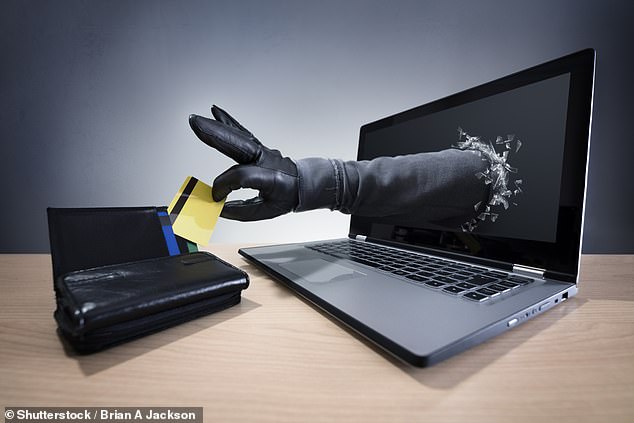Online scams: Not over-sharing means women less likely to fall victim to identity theft
Women are less than half as likely as men to have their identities stolen, according to a new study from Nationwide Building Society.
It found that only 11 percent of women had their identities stolen, compared to nearly 23 percent of men.
The survey found that women are much more likely to protect all of their social media accounts, with nearly two-thirds doing so compared to just half of men.

Concerns: More than two-thirds of people are concerned about identity theft, while nearly one in five has been victimized
Women are also much less likely to have friends or followers they’ve never met and less likely to disclose personal information publicly.
The survey also found that more than two-thirds of people are concerned about their identity being stolen and used fraudulently, with around one in six people actually being targeted.
Criminals can use a stolen identity to do a number of things. Of those whose identities were stolen, a third said it was used to order goods in their name, such as a mobile phone or car.
More than a quarter said it was used to access or steal money from their accounts, while one in five said it was used to borrow money in their name via a credit card or personal loan.
Card ID theft losses are up 86 per cent in the first six months of 2022 compared to the same period in 2021, rising from £11.5 million to £21.4 million, according to UK Finance, while the number of individual cases has risen more then doubled.
Card ID theft is when a criminal uses stolen or fake documents to open a card account in someone else’s name or takes over someone’s real account.
>> We need YOU to help the police catch the spoofing scammers
Avoid over sharing on social media
Social media is a ripe hunting ground: seven in ten Britons admit to sharing personal information there.
According to Nationwide’s research, a person’s full name, age or date of birth, and email address are the most shared items.
Despite uploading information that may put people at risk of identity theft, nearly a quarter have not made their social media accounts private and are only visible to friends or followers, neglecting their need for identity theft protection.


Rising: Card ID theft losses increased by 86% in the first six months of 2022 compared to the same period in 2021, according to UK Finance
In fact, according to Nationwide’s research, 22 percent of profiles can be viewed by anyone.
More than three-quarters don’t know how to protect their tweets, 61 percent don’t know how to make their Instagram profile private, while nearly two in five don’t know how to make their Facebook account private.
More than half of men have friends or followers on their social media they have never met, while just over a third of women admit this.
Ed Fisher, head of fraud policy at Nationwide Building Society, said: ‘While it is good to see that identity theft is on the rise, our research shows a worrying lack of measures people are taking to protect themselves.
Our identity is precious and criminals sometimes need just a few pieces of personal information to further attack you
We urge everyone to be vigilant by protecting their data and to observe a few basic tips – don’t share your information unnecessarily, be mindful of who is tracking your online activity, and protect your devices and accounts with both security software and strong passwords or codes that are not the same.
“Don’t give any information to anyone who unexpectedly contacts you, or respond to emails or text messages requesting information without carefully verifying that they are genuine.
Also, be sure to cancel or report lost or stolen cards immediately, and regularly check statements and credit files for any issues.
Only by taking precautions can we hope to prevent this type of fraud. The less we give the criminals, the less chance they have to strike.
“Our identities are precious and criminals sometimes need just a few pieces of personal information to continue attacking you.”
How to avoid becoming a victim of identity theft
Keep an eye on your administration
A clear sign that someone’s identity has been stolen is when unusual transactions appear on bank statements, or they receive correspondence that say a loan or credit card has been opened in their name.
It is therefore important to check bank statements for suspicious transactions and check credit files to see if anything has been opened in your name.
Never share personal information unnecessarily
This includes your account number, sort code, PIN, password, card reader access codes and any one-time codes.
When you give your account number and sort code to receive a payment, make sure you give it to someone you trust.
And never share information, such as your PIN or a one-time code, with anyone.
Use strong passwords for all your accounts
A strong password should be unique for each account. Don’t try to use the same one for different accounts such as your email, bank account, and insurance.
A strong password should also be at least 12 characters long, contain numbers and symbols as well as letters, and should not use any of your personal information.
That means don’t use things like a family member’s name, your address, or your pet’s name.
Cancel or report lost or stolen cards or other IDs
If your card, passbook or checkbook is lost or stolen, cancel or freeze it immediately.
If your passport, driver’s license or other ID is lost or stolen, report it immediately to the organization it came from.
Make sure that debit cards and checkbooks are kept away from shared or common areas whenever possible.


Oversharing: Posting details to social media sites appears to be a major vulnerability, with seven in ten admitting to sharing personal information there
Protect yourself and your money online
Install virus checkers on all devices. This also applies to your computer, laptop, telephone and tablet.
And don’t forget to keep them updated by regularly checking for updates or setting them up automatically.
Be careful when using social media – it is targeted by fraudsters to collect personal financial information.
Check your privacy settings to make sure only people you trust can view your account and messages.
Be wary when using your card in public
Whether you’re using your phone or online in a public place, be careful when using public Wi-Fi and make sure you’re not being listened to or people can see your information.
Keep paper documents safe – or go paperless
If you keep paper financial records, it’s vital that you keep only what’s necessary – and that it’s kept safe. Safely shred any statements and receipts you don’t need.
If possible, switch to paperless statements – the less paper lying around, the less likely your sensitive data will fall into the wrong hands.
Forward your mail if you move
Before you move, make a list of the companies that have your address. And be sure to update all of them as soon as you move.
You can ask Royal Mail to send mail to your new address for up to one year.
Some links in this article may be affiliate links. If you click on it, we may earn a small commission. That helps us fund This Is Money and use it for free. We do not write articles to promote products. We do not allow any commercial relationship to compromise our editorial independence.

